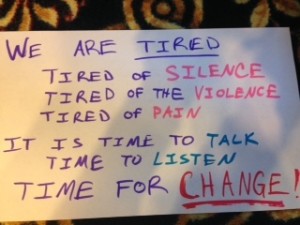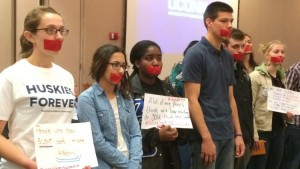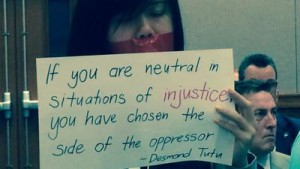EMERGING FEMINISMS, The Silence of Burning
By Grace Kuell
* “Collective Voice of the Voiceless”: Campus Violence, Resistance, and Strategies for Survival Forum Contribution*
I’ve written poems about Silence before
Poems about how loud
Silence can be
In my Family
Poems about my Silence
As a Victim
Of Bullying
Of Abuse
Of Sexual Assault
Of Harassment
Of Stalking
Poems about the Secrets
Silence keeps
But this is a different kind
Of Poem
Similarly,
A Poem about cycles of Violence
A Poem as Expression of thoughts
Kept inside
But a Poem for a time
When sound became visual
When We acted
Instead of being acted upon
This is a Poem,
Not so much of Knowing Reflections
But of current Confusions
And Struggles.
I watched the CVS burn
In Baltimore
I watched the crowds run
The Police move in
The Backlash online
I saw statements
That my whiteness immediately agreed with:
A waste
A shame
Why the Violence?
Then I saw Support
Proof
Of the Hypocrisy of whiteness
Of the Cycle of state violence that needs breaking
And I swallowed the other words
I’d heard
And remembered all I’d learned
Drowning
Trying to make sense of the
Mixed Messages of violence
Trying to come to an inner
Consensus
Of how I Feel
I’m sorry I ever doubted the use of violence as collective survival
And I’m sorry because part of me still wonders
If it’s Right
It’s now
Two Days later
I stand in Solidarity
With Blood Red
Tape over my mouth
Sign in hand:
WE ARE TIRED
TIRED OF SILENCE
TIRED OF THE VIOLENCE
TIRED OF PAIN
IT IS TIME TO TALK
TIME TO LISTEN
TIME FOR CHANGE
I listen to the Stories
Of Anonymous Peers
Who Hurt
Who Write
Who are Silent No More
And I think:
We all aren’t just Searching
For Solutions
We are claiming our Right
To be Heard.
I have heard
That yelling “Fire” is more Effective
Than yelling “Rape”
So now I understand
That Baltimore has had to
Make Fire in the Streets
to be Heard
Maybe fire can end
racial and gender Violence
In Baltimore
And College Campuses
In this Country
I don’t know how I Feel
About Violence sometimes
I want to Believe in Peace
And peaceful protest
But then I hear the Echoes of Names:
Dante Parker.
Jason Harrison.
Tyree Woodson.
Akai Gurley.
John Crawford III.
Eric Garner.
Michael Brown.
And I hear the Echoes of Names:
Silvana Moccia
Kylie Angell
Rosemary Richi
Erica Daniels
I sit in Silence
Sometimes it is Good
I think
And I Wonder.
I wonder:
Where
Is Joseph Kent?
Where
was the support
For Carolyn Luby?
~~~
 This poem is not complete. It is written to express and make sense of the chaos in my mind, but it cannot contain it all. I offer this explanation to further organize my thoughts and to connect two significant events that come together in my mind and are teaching me about violence and myself– the Baltimore Riots and the Silent No More Protest at UConn.
This poem is not complete. It is written to express and make sense of the chaos in my mind, but it cannot contain it all. I offer this explanation to further organize my thoughts and to connect two significant events that come together in my mind and are teaching me about violence and myself– the Baltimore Riots and the Silent No More Protest at UConn.
On Monday, April 27, 2015, Baltimore’s streets were aflame and a CVS burned. In the following days I couldn’t get Baltimore out of my mind. I watched as the racist hate speech against Baltimore communities, turned into support of and for Baltimore communities. My fellow “Facebook Feminists” posted articles on the hypocrisy of whiteness – naming the times that whites “rioted” and nothing happened. And how change has come from the use of violence against the state. In this moment, I felt the weight of everything I’ve learned from my own journey: the injustice, the violence, the pain, the sorrow, the fear. And I remembered how I felt.
Freshman year of college I was facing three Title IX cases, still living among the men I had reported. I was tired, hurt, sad, scared. I wanted to know that what I was doing was right, but doubt can be like an old friend sometimes. As I watched Baltimore burn in my mind, I understood the unbelievable anger. I know for myself, there have been times where non-violence feels unimaginable. When the injustice you have faced boils inside of you and you feel like you are going to erupt.
But there were also non-violent protests for days before the fires. At first I didn’t understand why this changed, I was upset that the media coverage of the riots failed to show and discuss the efforts of thousands of protestors. Peaceful protesting is powerful; it is what I want to believe in as the answer to violence’s questions.
So, I have seemingly opposite inclinations: a yearning for peace and violence.
Despite my conflictions, the morning of Wednesday April 29, 2015 I stood in solidarity at the University of Connecticut Board of Trustees meeting. I, among twenty or so other students, duct taped our mouths and wrote signs to say what our vocal chords had failed to, what the Administration had suppressed. This was a peaceful protest against the violence and injustice on UConn’s campus. But make no mistake, it was the kind of protest with fire behind it as we demanded institutional accountability. Each of us had our own reasons for showing up, for what we wrote, for what we said if we spoke. It felt productive to visibly show that even if we are tired, we will not stop. As people asked the Board repeatedly if they were really listening, we heard time and again, “We hear you, we are listening, and we agree.”
Yet, some part of me didn’t believe them. I didn’t trust that they really heard, that they really wanted to do something this time.
I believe in Leela Fernandes’ argument and I believe I am experiencing my own transformation of disidentification and divestment in systems of domination. But I still struggle to trust the meaning of transformation. I struggle to trust that change is possible, that solidarity exists. Because what has changed after Baltimore? After our protests at UConn?
I am still working on how to express my political solidarity within a deep context of white supremacy that thrives off of racial, sexual, and gender violence. I understand I have my privilege within this system—and I am working on how to articulate what anti-oppression means to me.
I have just come into Feminism, and while I feel empowered and I have found a community within it, Feminism has also given me the space to be OK with the fact that I am stuck between a politics of love and a politics of rage. Despite my inner conflicts and struggles, I heed Audre Lorde’s call and continue “my work.” Social Justice requires work and reworking of ourselves. I have started and I am committed to this work—be it in the church, alongside my peers, with the support of brave faculty and graduate students—because even if I’m not doing this work exactly right, it is a start. It is the beginning of a lifelong journey committed to helping build an equitable community, society, and world.
**********
 Grace Kuell is a junior double majoring in Psychology and Women, Gender and Sexuality Studies at the University of Connecticut. She has always loved writing, taking after her father who became a free-lance writer after losing his sight. She has often found relief and a sense of solace from writing about the things that trouble her and can be very hard to speak about. She is a Resident Assistant for Social Justice at UConn and continues to partner with members of her church on Social Justice Initiatives.
Grace Kuell is a junior double majoring in Psychology and Women, Gender and Sexuality Studies at the University of Connecticut. She has always loved writing, taking after her father who became a free-lance writer after losing his sight. She has often found relief and a sense of solace from writing about the things that trouble her and can be very hard to speak about. She is a Resident Assistant for Social Justice at UConn and continues to partner with members of her church on Social Justice Initiatives.






Pingback: EMERGING FEMINISMS, An Introduction to the "Collective Voice of the Voiceless" Forum on Campus Violence, Resistance, and Strategies for Survival - The Feminist Wire | The Feminist Wire